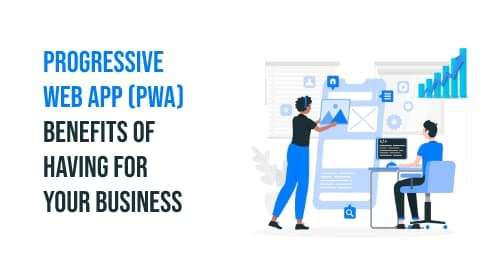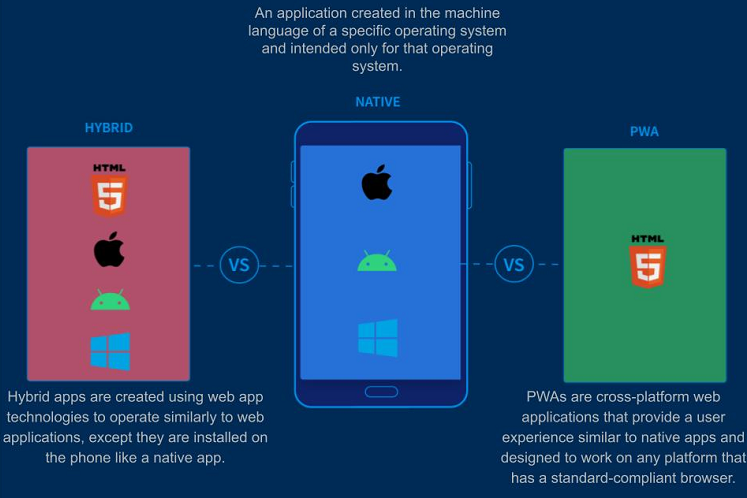
What Are the Benefits of Making Your Website a PWA (Progressive Web Apps)
As the online market expands, developers and businesses seek ways to get their applications and products to their customers and target audiences more quickly and efficiently. Building progressive web apps has several benefits, including speed, offline navigation, and lower development costs. As a result, PWAs offer businesses limitless opportunities and are an excellent way to engage customers and increase conversion rates. This blog post will look into how Progressive Web Apps can drive business success, a.k.a. the main benefits of Progressive Web Apps for businesses.
Furthermore, you will learn how businesses can benefit from progressive web app development services.
What are Progressive Web Apps (PWA)?
The phrase "Progressive Web App" was coined in 2015 by designer Frances Berriman and Alex Russell, an engineer at Google Chrome. The term refers to apps that use cutting-edge features supported by modern browsers, enabling developers to build web applications that look exactly like native apps.
It was created to describe applications that use modern browsers and the features they provide to build offline-capable, hardware-accessible, and relatively quick modern web applications that typically deliver a native application like User Experience. With many major firms embracing the technology and the features it promises to provide, the PWA has developed into a popular term and application in the technology industry regarding web-based solutions.
So, why use progressive web apps? The PWA mobile app provides an app-like experience and is built with open web standards and functionality (HTML, CSS, and Javascript). They combine the best of the web and native mobile apps, such as quick loading, offline use, and installation on the home screen. PWAs enhance the user experience by combining manifests, service workers, and web-based features with progressive technology to provide a product that represents native mobile applications.
A quick comparison of Native, Hybrid, and Progressive Web Apps is shown below:

- Native apps are developed utilizing programming languages or platform-provided technologies (iOS or Android). They are installed from an app store and run directly on the device (desktop or mobile) without a browser.
- Hybrid apps are developed using web technologies (HTML, CSS, and JavaScript) and can access platform features that a browser cannot.
- With Progressive Web Apps, websites load instantly on any connection, whether you're online or not. They are created to operate on any device, but they allow access to the platform features of browsers.
Key Benefits of Progressive Web Apps for Business
Although progressive web apps are a relatively new phenomenon, many businesses are already reaping the benefits of PWAs. Let's look at the key benefits of Progressive Web Apps for businesses to see why companies, from startups to market leaders, should use them.
-
Reduced Development Costs
Businesses should create, maintain, and promote a different version for the Android and iOS operating systems when developing native apps. However, to get a working solution, businesses must hire two teams. As a result, the cost of developing a mobile app increases twice.
The PWA mobile app does not require separate versions for different devices; a single progressive app meets the needs of all endpoints on which it operates. As a result, it significantly lowers the effort developers provide, and the cost of creating a PWA decreases. Compared to a native mobile app, the cost is three or four times lower.
-
Offline Mode Operation
One of the features that people want the most is offline navigation. If your connection stops, it prevents you from losing access to crucial data and services. Even on unstable networks, PWAs can perform well. Built-in Service Workers automatically cache a Progressive Web App's essential content. It implies that you won't need to download it every time you launch the application.
Furthermore, even without an Internet connection, they may still access the necessary data. Residents of rural areas with unstable Internet connections and consumers during the day can benefit significantly from using the PWA mobile app.
-
Quick Installation
PWAs, unlike traditional mobile applications, do not require a lengthy and complex installation, considerably improving the user experience. Users download an app directly to their devices without visiting the App Store or Google Play. It simplifies the process and reduces user abandonment considerably. After downloading an app, users can access it via a desktop icon.
When users visit the respective websites, some browsers provide call-to-action buttons that prompt them to download the apps. This feature is built into browsers and increases apps' reliability and credibility.
Furthermore, since this software does not involve device installation, users can access the PWA through a URL, contributing to its high shareability.
-
Look and Feel Like Native Apps
By incorporating the look and feel of mobile applications with the best website performance, progressive web applications provide an enhanced user experience. They have a design and configuration similar to native mobile software. Regardless of the technologies, tools, and frameworks used to create PWAs, they provide the same user experience as native mobile apps and are considered superior to websites.
They also have the same levels of responsiveness, speed, and functionality as websites that access databases and get automated data. As an outcome, search engines index them, showing how Google and Bing can find PWA pages. The pages of such applications may be found online, which positively affects the number of page views, in contrast to mobile software, which keeps its internal data only for its purpose.
-
Increased Interactions with Customers
Progressive Web Apps enable businesses to engage with customers in various ways. First, companies can notify customers via push notifications about new arrivals and offers. Additionally, users receive customized offers and updates on the status of their orders.
E-commerce businesses will significantly benefit from this strategy. They average users' time on the website by sending push notifications. As a result, online marketplaces have a greater possibility of turning visitors into paying consumers.
Push notifications are an effective marketing technique that boosts brand recognition and increases sales.
Additionally, users can return to the website much faster due to the "Add to Home Screen" feature of Progressive Web Applications. As a result, it becomes easier for individuals to reconnect with their preferred brands.
-
Excellent Performance
PWA uses service workers to perform labor-intensive tasks, resulting in a faster loading time. These scripts operate independently of the web page and prefetch all the information required to maintain quick and seamless navigation. Additionally, since the scripts are not active on the page, they have no impact on how quickly the page loads. Navigation across the app becomes almost instantaneous once the data has been cached. Users don't need to load any resources to have the app ready after adding it to their home screen.
-
Device and Platform Agnostic
The best performance and a platform-specific experience are ensured by native development. However, the project must be developed twice and customized for each device, which is a downside.
When creating PWAs, there is a focus on looks, user experience, cross-platform compatibility, and all device support. Due to their lower cost and compatibility, even major companies like Starbucks, Twitter, Forbes, etc., have chosen to utilize Progressive Web Applications. When using PWAs, issues like device incompatibility and unsupported resolutions are eliminated because modern web browser technologies ensure the app fits any device correctly.
-
Eliminates the Necessity of Third-party App Distribution
The cost of publishing your application on an app store is added to the project. Some stores charge a fee and require the project to go through a regulatory and time-consuming publishing & validation process before you can deliver the app to the end user. This process will increase costs and lengthen your estimated market time, which can result in missed opportunity windows for commercial holidays or the publication of untested builds to adhere to a deadline.
You can avoid the complete app store problem when working with PWAs. They are convenient for consumers & businesses because they allow users to access your app and receive updates without downloading different versions or waiting for another verification round.
-
No Issues with Updating
PWAs have a unique feature that automatically updates without notifying users or bothering them with authorization requests. These apps update themselves every time users visit them, eliminating the need to download and install batch changes. They provide a new look with no human involvement.
However, some progressive app developers send push notifications informing users of the arrival of a new update. Producers have complete control over the information and content that users can access.
-
Enhanced Security
Many businesses are concerned about security incidents and cyber-attacks these days. Therefore, security becomes an important consideration that should be considered. Negligence in this area can severely harm your brand's reputation. PWAs rely on HTTPS to protect data and reduce the risk of security issues, as this protocol prevents snooping & content tampering. Furthermore, the applications use Web Bluetooth technology, which includes certain security features.
Why Use Progressive Web Apps?
Progressive web apps are efficient and economical. They operate on demand and are always accessible without consuming valuable smartphone memory or data. Users who choose a PWA over the native version of a similar application consume less data. However, this does not imply that users should sacrifice the ease of a native app. They can still save the PWA to their home screen; it's installable without needing a full download.
PWAs are easier to build and manage. You can also develop a single app version that runs on all devices smoothly and identically. In addition, PWAs are unified to work on browsers common to all devices, as opposed to the specific market of native mobile apps, where businesses require a separate app structure for Android and Apple devices. Even better, they are less expensive to develop than native mobile apps.
Here are some examples of successful Progressive Web Apps:
- Uber
- BMW
- Flipkart
- MakeMyTrip
- Alibaba
- Trivago
- Spotify
- Starbucks and more
PWA will be the next game changer in the mobile web world. The benefits of Progressive Web Apps boost the brand's conversion rate with eye-catching features, such as a fast-loading page function and offline functionality that enhances more value. In addition, it incorporated the methodologies for developing reliable and engaging experiences that benefit users when using the PWA mobile app.
As a leading Progressive Web App development company in India, Innoraft creates PWA development services that are lite, look & function more like native apps, and load quickly regardless of internet connection.
Are Progressive Web Apps the Future?
The simple answer is yes, and we believe PWAs are the way of the future. They are gaining popularity, and the technology industry is investing heavily in these applications. Moreover, PWAs are already functional with browsers such as Chrome and Opera, and other browsers like Microsoft Edge, Safari, and Firefox are working to support them. So, yes, Progressive Web Applications have the potential to be the web's future.
Google, Apple, and Microsoft—the three major native app distribution standards—are all driving the transformation to PWAs. However, because of the benefits of progressive web apps, they remain ahead of the curve in the mobile industry. PWAs show that any business, from Twitter to Starbucks, can significantly benefit from this technology.
Conclusion
PWAs substantially enhance user experience and retention levels by integrating the most useful functionality of native mobile software and web applications. So it's easy to understand why several notable brands are migrating from native apps to PWAs. As a Progressive Web App development company, Innoraft has embraced cutting-edge tools and technologies that make the application faster and easier to develop, understand, and test.
So get in touch with us; we can help you create applications that use this technology to grow your business, and you can see how Progressive Web Apps can drive business success.





